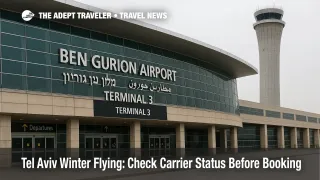Tel Aviv Winter Flying: Check Carrier Status Before Booking

Ben Gurion International Airport (TLV) is open and operating normally, according to Israel's authorities, but winter service remains uneven by airline. United resumed in July and is expanding from additional U.S. gateways in November, while ITA Airways has extended its pause through the end of 2025. Ryanair has scrapped its low-fare winter program amid a dispute over access to the low-cost terminal. For travelers, the takeaway is simple, confirm your operating carrier, gateway, terminal, and refund rules before you lock in connections or separate tickets.
Who's flying, who's not
United Airlines resumed daily service to Tel Aviv in July 2025 and has since announced additional winter flying from Chicago O'Hare and Washington Dulles, with the first departures in early November. Those routes sit alongside the EWR service that restarted earlier in the year. If you are connecting in the United States, these additions restore some long-haul options outside New York, which has carried most of the U.S.-origin demand since 2023.
Across Europe, schedules remain mixed. Wizz Air publicly reaffirmed a large winter program to and from Tel Aviv, including multiple Italian and Central and Eastern European gateways. Aegean has also brought back flying from Athens. Other carriers have taken a more cautious approach, with ITA Airways formally extending its suspension until at least December 31, 2025. That creates gaps from Rome and reduces SkyTeam connectivity into Israel for the rest of the year.
Ryanair, which typically relies on Ben Gurion's Terminal 1 for low-cost operations, canceled its entire low-fare winter program to Tel Aviv. The airline cites the airport's refusal to confirm Summer 2026 slots and uncertainty about access to Terminal 1 during security events, which Ryanair argues makes winter flying unprofitable if it is forced into the costlier Terminal 3. That decision erases 22 routes' worth of low-fare capacity for the season.
Terminals and what to expect at the airport
For most international travelers, Terminal 3 remains the default. Full-service and long-haul carriers operate there, while Terminal 1 handles selected low-cost and domestic traffic when open. Given recent security-driven shifts, airlines may be reassigned from T1 to T3 at short notice, so verify your terminal the day before departure and again on day-of. Use the official airport pages for current terminal information and airline listings.
From a traveler's perspective, Terminal 3 provides a more predictable check-in and security flow and direct access to the rail station underneath the terminal, which can shorten transfers into Tel Aviv. If you booked a low-cost carrier that historically used Terminal 1, build a cushion for possible busing or terminal changes.
Refunds, waivers, and what to do if your flight is paused
When an airline suspends Tel Aviv service, customers are generally offered rebooking at a later date or a refund. ITA Airways has publicly confirmed those options through the end of the year. Low-cost carriers that withdraw seasonal programs, such as Ryanair, typically process refunds or reroute customers on alternate dates, but options may be limited where a carrier has no replacement service. Always review your airline's current policy before you make changes on your own, especially if you are traveling on separate tickets or with partner airlines.
If your flight operates but you want flexibility, check whether your fare class or credit-card benefits include no-fee changes, then weigh the value of keeping your itinerary intact versus a voluntary change. For connecting trips, avoid tight layovers and consider same-airline, same-PNR itineraries to protect your onward segments.
Alternate routings via Larnaca or Amman
If nonstop options are thin on your preferred dates, Larnaca, Cyprus (LCA) and Amman, Jordan (AMM) remain practical alternates. Cyprus Airways is actively selling Larnaca-Tel Aviv round-trip inventory this winter, enabling a two-ticket strategy via European hubs into Larnaca and a short hop into TLV. Amman can work as an alternate Middle East hub with broad long-haul connectivity, but conditions can change quickly. If you plan to cross by land between Israel, the West Bank, and Jordan, verify the Allenby/King Hussein Bridge hours in advance and allow significant buffer; openings and closures are subject to security directives. Travelers should also consult official advisories about the risks of routing via neighboring countries.
Bottom line for alternates, keep itineraries as simple as possible. If you must use separate tickets, leave generous time between flights, avoid late-night land crossings, and confirm visa and entry requirements on both sides before you buy.
Background
Ben Gurion has remained operational for much of 2025, even during periods of heightened alert. The biggest variable for travelers has been airline-by-airline risk tolerance and operational constraints, from flight-crew housing to aircraft insurance. That is why schedules differ and may be adjusted with little lead time. Israel's authorities continue to state that airport operations are normal, but airline decisions will dictate your actual options on the day you want to fly.
Final thoughts
The primary keyword here is Tel Aviv flights. If you are booking for late November or December, pick an operating carrier with a stable gateway, verify your terminal, and keep your plans flexible. If you need alternates, Larnaca and Amman can bridge gaps, but only with careful planning around hours and advisories.
Sources
- Current situation in Israel regarding safety for civilian aviation
- United Resumes Flights to Tel Aviv, Israel from Chicago and Washington D.C.
- United to restart service to Tel Aviv, Israel
- ITA Airways extends Tel Aviv flight suspension until end of year
- Ryanair will not restart Tel Aviv flights, as Ben Gurion Airport refuses to confirm S26 slots, or availability of low-cost Terminal 1
- Wizz Air reaffirms Tel Aviv commitment with over 1 million seats for Winter 2025
- Ben Gurion Airport, official terminal information
- Allenby Border Crossing, opening hours
- Cyprus Airways schedules and TLV-LCA fares
